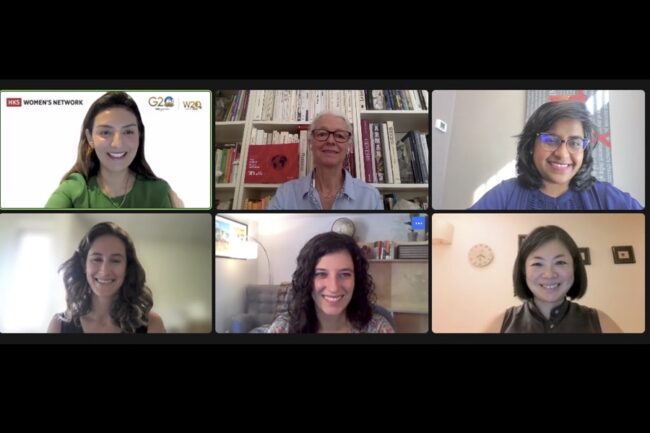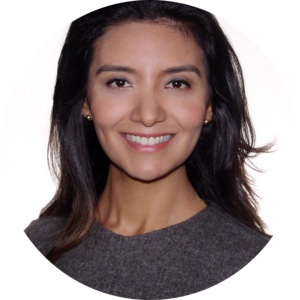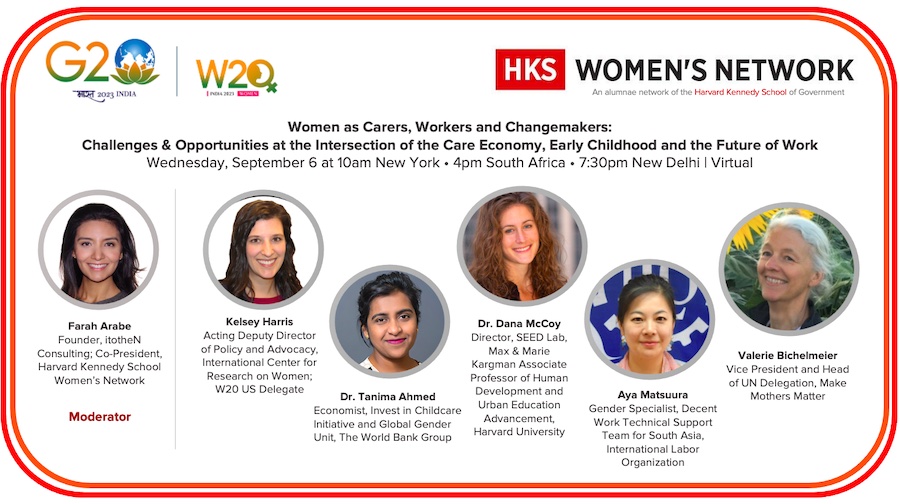Care experts agree: redistribution key to achieving Gender Equality
17.09.23
Redistributing care work was a central topic at a wide-ranging discussion recently hosted by Harvard Kennedy School Women’s Network and the Women 20 (W20) organization.

𝐖𝐨𝐦𝐞𝐧 𝐚𝐬 𝐂𝐚𝐫𝐞𝐫𝐬, 𝐖𝐨𝐫𝐤𝐞𝐫𝐬 & 𝐂𝐡𝐚𝐧𝐠𝐞𝐦𝐚𝐤𝐞𝐫𝐬: 𝐂𝐡𝐚𝐥𝐥𝐞𝐧𝐠𝐞𝐬 & 𝐎𝐩𝐩𝐨𝐫𝐭𝐮𝐧𝐢𝐭𝐢𝐞𝐬 𝐚𝐭 𝐭𝐡𝐞 𝐈𝐧𝐭𝐞𝐫𝐬𝐞𝐜𝐭𝐢𝐨𝐧 𝐨𝐟 𝐭𝐡𝐞 𝐂𝐚𝐫𝐞 𝐄𝐜𝐨𝐧𝐨𝐦𝐲, 𝐄𝐚𝐫𝐥𝐲 𝐂𝐡𝐢𝐥𝐝𝐡𝐨𝐨𝐝 & 𝐓𝐡𝐞 𝐅𝐮𝐭𝐮𝐫𝐞 𝐨𝐟 𝐖𝐨𝐫𝐤 looked at the current state of the care economy, the science behind early childhood and the challenges and opportunities in balancing the success and well-being of those who give care and those in need of care.
 Steered by Farah Arabe, Founder @ itotheN, Co-President of HKS Women’s Network, and a passionate advocate for the transformative potential of early childhood development for sustainable and inclusive global development, the discussion was insightful bringing together many leading industry names and a virtual audience from around the world.
Steered by Farah Arabe, Founder @ itotheN, Co-President of HKS Women’s Network, and a passionate advocate for the transformative potential of early childhood development for sustainable and inclusive global development, the discussion was insightful bringing together many leading industry names and a virtual audience from around the world.
Farah pointed to ILO research figures that puts women and girls as performing more than three quarters (76%) of the total amount of unpaid care work in the world, and that in no country in the world do men and women provide an equal share of unpaid care work. With those statistics as background, the event also asked: What are the drivers of gender inequality in the care economy? How do we move closer to eliminating the gender gap in labor participation and wages? How will the world prepare for the increasing care needs of the future?
One point the panel was unanimously agreed on: men have a huge role to play in altering existing Care inequities. That any solutions, for achieving gender equality, lies in their involvement.
MMM Vice President and head of the UN delegation put the spotlight on this message saying: “Redistribution is absolutely key between men and women essentially, but also across the broader society. Recognizing care as a collective responsibility is the way forward.”
The panel also emphasized the importance of providing quality and accessible childcare as part of redistribution, benefiting both mothers and early childhood development.
Dana Charles McCoy, Assistant Professor at Harvard Graduate School of Education, said: “Economic research has been very clear that for every dollar in early childhood care and education programming, societies reap tremendous benefits, far more than the dollar they have invested.”
Tanima Ahmed Ph.D, Economist, Invest in Childcare Initiative and Global Gender Director unit at The World Bank reminded everyone that “if you provide childcare, it’s one solution which can help mothers, which can help children, which can help families and overall help the economy…we cannot have gender equality without supporting mothers and women in this area. And move forward.”
Aya Matsura, Technical Expert at International Labour Organization’s Decent Work Team for South Asia in New Delhi, added: “Investment in childcare or the care economy… will have multiple benefits in terms of gender equality…women’s labour force participation…building future workforce and sharing the wellbeing of children.”
And Kelsey Harris, Acting Deputy Director of Policy and Advocacy at the International Centre for Research on Women (ICRW) drew attention to the fact that “Investing in care services, including childcare, can create employment, reduce the wage gap, and generate overall economic growth.”
→ Watch the recording (Password: ZR.Sp1@+)

The New EU Gender Equality Roadmap : A Call for Inclusion of Mothers
04.03.25
The European Commission’s initiative on a new Gender Equality Roadmap post-2025, marks a significant step forward in addressing gender disparities across the European Union. Make Mothers Matter (MMM
Breaking the Cycle: Gender Equality as a Path to Better Mental Health
18.03.25
The Council of the European Union has taken a decisive step in recognising the vital connection between gender equality and mental health.
Europe Must Listen to Mothers: Our landmark report heads to the European Parliament
28.08.25
On 22 September 2025, the voices of mothers will take centre stage in Brussels. For the first time, Make Mothers Matter (MMM) will present its State of Motherhood in Europe








